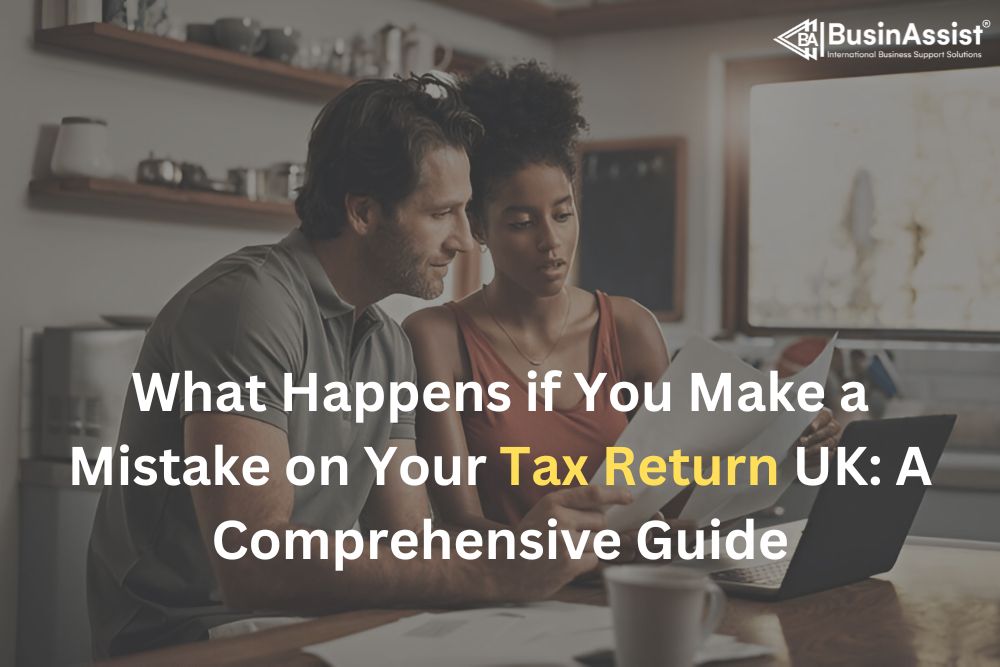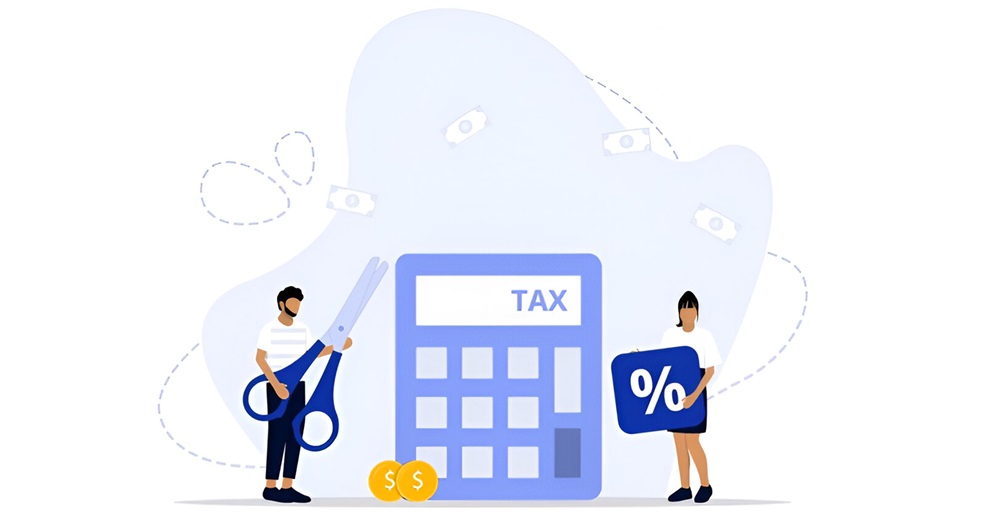Last Updated on December 18, 2025 by Joy Kyalo

When forming a company in the United Kingdom, business owners need to understand tax compliance. Every business, whether a sole trader or a limited company, must register and pay taxes annually.
After the end of every financial year, limited companies must prepare annual accounts and company tax returns. The financial year varies depending on the day a company was registered by Companies House. The accounting period is usually 12 months but can be extended to 18 months.
During the accounting period, companies rush to file taxes so as not to miss the deadline as missing a deadline could cost penalties. This rush hour may make businesses make mistakes which brings businesses negative implications.
Now what happens if you make a mistake on your tax return UK? This guide will explore how tax returns can be amended.
What are business taxes?

In the UK, there are several company structures entrepreneurs can choose from. They are; Sole trader, partnership, and limited company. All these companies must file taxes with HM Revenue & Customs (HMRC).
A sole trader business structure is operated by an individual, so the individual pays taxes on their income and National Insurance (NICs) through Self-Assessment.
For partnership structure, the company does not pay taxes by itself. Partners are responsible for paying their own taxes. The taxes are paid depending on whether the partner is a sole trader or a limited company.
A limited company structure is responsible for paying its taxes since they are an entity on its own. They pay Corporation Tax annually and register for Pay As You Earn (PAYE) deductions if they have employees. Corporation Taxes are due by no later than 9 months and 1 day after your ‘accounting period’ for Corporation Tax ends.
All businesses must register for Value Added Tax (VAT) if their turnover threshold is over £90,000. However, businesses can choose to register for VAT voluntarily. Generally, businesses need to send HMRC a VAT return once a quarter.
When is the accounting period of a company?
The accounting period of companies in the UK differs. Once a limited company is registered, Companies House provides an Accounting Reference Date (ADR). The date usually falls under the anniversary of the last day of the month of UK company formation.
For example if you registered your UK company on 5th December 2024, your accounting reference date will be 31st December every year from 2025. Your company’s financial year will run for 12 months from 1st January to 31st December every year.
Moreover Annual Accounts must be filed to Companies House every year. The deadline is 9 months after the end of your financial company year.
A financial year can be changed as long as annual accounts are not overdue. You can either shorten or lengthen your company’s accounting reference date. The ADR can be shortened by as many months as you want and as often as you want provided it is not the first set of annual accounts. In extending the financial year, a company can only extend it to 18 months from their previous ADR, however, this can only be done every 5 years unless Companies House provides special permission, the company is in administration, or you are aligning the dates with the group that your company is part of.
Once your company’s ADR has changed, Companies House must be notified through Form AA01.
What happens if you make an error in your tax return?
What happens if you make a mistake on your tax return UK is that there are implications, but you can amend the errors. Mistakes are treated differently by HMRC depending on whether the error was made mistakenly or deliberately.
There are time limits to amend these mistakes. Tax returns can be amended within 12 months of the normal filing deadline.
If a mistake happens in tax returns, there can be hefty penalties charged by HMRC depending on the severity of the error made. HMRC will also impose penalties depending on the intent behind the mistakes made.
HMRC can impose a penalty of deliberate error between 20% and 70% of the extra tax due, concealed error or error made due to lack of reasonable care may be charged between 30% and 100% of the extra tax due.
Whether you are charged minimum or hefty penalties, depends on if you informed HMRC or HMRC informed you. If you made the mistake genuinely, you can negotiate the penalty with HMRC since it is generally possible.
When to amend tax returns?
You should amend your tax return immediately when you realise you have made an error. However, you are supposed to wait for 72 hours after filing the tax returns.
You have up to 12 months from 31st January the end of the tax year to which the tax return relates. However, if the notice to file the return was issued after 31st October, you can amend it within 15 months of that notice being issued.
Suppose you used provisional figures when you originally completed your tax return because you were missing some information. In that case, you should amend the tax return to replace the provisional figure with the actual figure as soon as the relevant information becomes available.
Conclusion:
In conclusion, what happens if you make a mistake on your tax return UK is that you can amend errors made on your tax return, whether the mistake was made genuinely or carelessly. However, you will be penalised for making an error. The amendment should be made within the time limits mentioned in this article.
BusinAssist helps businesses file annual accounts, confirmation statements, and VAT returns. With our services, companies can stay compliant and meet all the deadlines preventing them from being penalised.
For more information on filing statutory records, contact us at info@businassist.com.
FAQs:
Q: How to correct a mistake on a tax return?
Ans: If you filed your tax return online, amendments can be made online through HMRC’s self-assessment portal. It can also be made via paper application by writing to HMRC. If you used accounting software to file tax returns, you should use it to amend errors as well.
Q: Who is responsible for tax return mistakes?
Ans: Directors are responsible for tax return mistakes. Directors are responsible for filing tax and statutory documents yearly. However, they can also appoint a secretary or an accountant to do that on their behalf. If a mistake is made by them, the director will be held responsible by HMRC.
Q: Can you correct mistakes on a tax return?
Ans: Yes, you can correct mistakes on a tax return whether made genuinely or carelessly. You can amend a tax return within 12 months of the Self-Assessment deadline.
Q: How to amend a mistake in a previous tax return?
Ans: You can make a change to a tax return after you filed it. To change an error online, you must wait for 3 days after filing before updating your return. You can amend an error made via following steps:
- Log in to your account
- Choose ’Self Assessment account’ from your ‘tax account’.
- Choose ‘More Self-Assessment details’.
- Choose ‘At a glance’ from the left-hand menu.
- Choose ‘Tax return options’.
- Choose the tax year for the return you want to amend.
- Go into the tax return, make the corrections and file it again.
If you want to make changes on paper, you can download the SA100 tax return form from HMRC.
Read Also:
- Do I Have to Pay Tax on Money Transferred from Overseas to the UK? Everything You Need to Know
- Can HMRC Access Your Bank Account? What Every Taxpayer Should Know
- What is a Tax Office Reference Number and How Can I Find It?
- Understanding the Timeline: How Long Does It Take to Get a Tax Refund After Self-Assessment?
- How to Change Your SIC Code on Companies House: A Step-by-Step Guide for UK Businesses
- Lost Your Government Gateway User ID and Password? Here’s How to Find Them
- How to Fill Out a Stock Transfer Form J30: A Step-by-Step Guide
- A Step-by-Step Guide to Resign as a Director of a Limited Company

Joy is a content writer at BusinAssist with 6+ years of experience in content marketing and social media strategy. She specialises in company formation and virtual operations, guiding entrepreneurs through global markets with clarity, drawing on her marketing and PR background. Business Assist with BusinAssist – your business success partner.